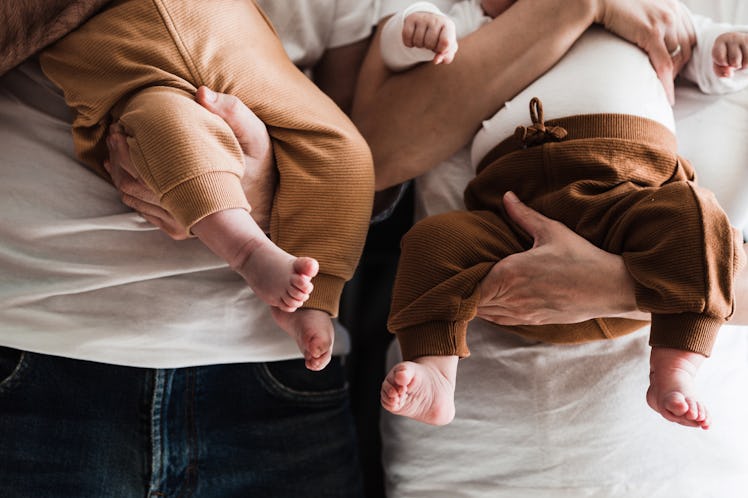This Baby Name “Uniqueness Analyzer" Will Help You Pick The Most Original Baby Name
Dead set on a baby name, but don’t want your kid to be one of a million Emma’s or Liam’s in her class? Check out this baby name uniqueness analyzer.

Coming up with a baby name that you love — that’s not too on trend, but not too old-fashioned, that’s popular but not too popular, that’s unique and interesting and beautiful all at once — is a tall order. If what you want is a baby who doesn’t become the type of kid who goes by their first name and last initial — Liam K’s, Olivia G’s, and Emma R’s abound in classrooms across the country — this very neat baby naming tool, a baby name “uniqueness analyzer,” may help you choose a baby name that will stand out from the pack.
The tool, aptly called the “Baby Name Uniqueness Analyzer,” calculates how likely someone with a given name is to come across another person with the same name based on data from the Social Security Administration from 2021. The analyzer was developed by computer scientist Sarah Tyler, Ph.D., and is one of many tools Tyler has developed to find unique ways to look at data.
“As someone who had two other 'Sara's (spelled differently) in her kindergarten class, I am fascinated that the probability of a kindergarten class of 35 in 2023 having any two children with the same name is only 41.9%,” she explained.
“The probability of a kindergarten class having three children with the same name? Just 1.6%. That doesn't mean it never happens. With so many kindergarteners in the US, we estimate approximately 2,791 kindergarten classes across the country will have three kids with the same name.”
So, are you trying to make sure your baby is unique? Different? Marching to the beat of their own baby name drum? Use the tool.
For example, the tool reveals that if you were born a Noah in 2021, you’re in good company. It’s the 2nd most popular baby boy name in 2021, and the 691st most popular baby girl name in the same year. One out of every 99 baby boys in the U.S. born in 2021 was named Noah. “With an average elementary class size of 482 in the US, an individual with the name Noah would have a 91.625% probability of going to school with a boy named Noah and a 5.334% probability of going to school with a girl named Noah,” the tool reveals.
The name Oliver is almost equally popular. In 2021, 14,616 baby boys were named Oliver — but only 25 baby girls were named the same, making it a much more unique name for girls than boys. Kids name Oliver are bound to meet each other: “An individual with the name Oliver would have a a 85.516% probability of going to school with a boy named Oliver and a 0.33% probability of going to school with a girl named Oliver.”
Meanwhile, Amelia, the 4th most popular baby girl name in the U.S. overall (and the 8,775th most popular baby boy name) would be highly likely to meet another Amelia at school. Per the uniqueness tool, each Amelia has a roughly 82% probability of meeting a girl with their name in school, and just a 0.1% of going to a school with a boy named Amelia.
And Emma? Forget it! As the 2nd most popular baby girl name in 2021, 15,433 girls born that year are walking around with the name. An Emma at school has an 87.08% probability of meeting another Emma.
As for the slightly more unique names, that’s where it gets fun. A baby boy named Wolf would be a hard baby to find: Only 105 baby boys were given that name in 2021. Wolf would only have a 1.3% probability of going to elementary school with another boy named Wolf — slim pickings indeed! A baby girl named Mira (the 483rd most popular baby girl name in 2021) would only have an 8% chance of going to school with another Mira.
You don’t have a looking glass, and you can’t 100% predict what baby names will blow up in popularity in the future. But if you’re worried about having a unique baby name for your future kid, don’t worry too much. Just have fun with this unique tool.
To try it out yourself, check out the Baby Name Uniqueness Analyzer.